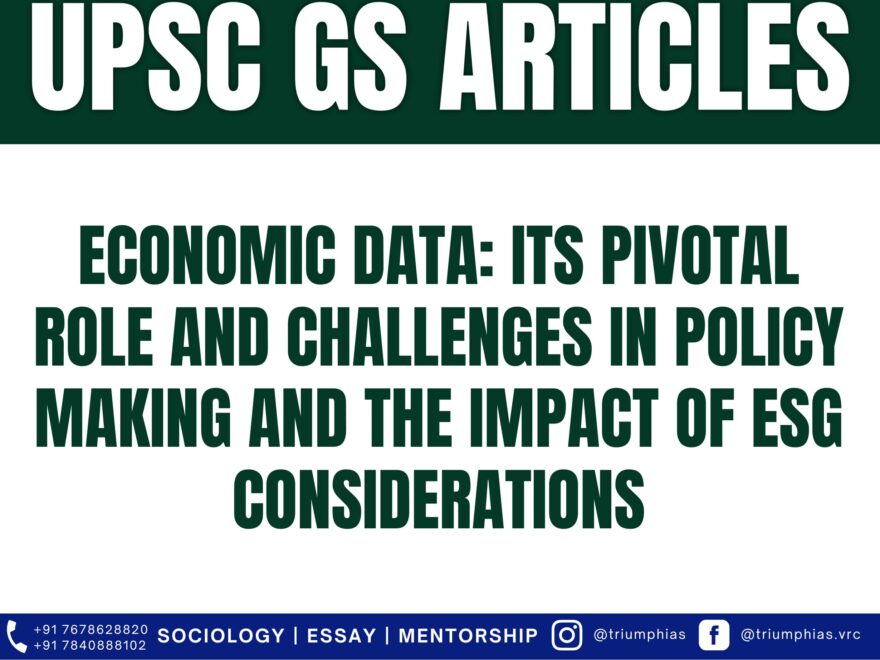Economic data:
ROLE IN ECONOMIC GROWTH
(Relevant for General Studies Paper Prelims/Mains)

Economic data holds immense significance in the process of policy making as it equips policymakers with crucial information regarding the state of the economy. This data aids in evaluating the present economic performance, identifying socio-economic obstacles, and devising effective policies.
Nevertheless, challenges may emerge when economic data is flawed, delayed, or inadequately customized to suit the unique requirements of a country such as India. It is imperative to address these challenges in order to guarantee well-informed decision-making and the development of policies that promote inclusive and sustainable growth.
Advantages of Economic Data in Policy Making
- Economic data serves as a valuable tool for policymakers, offering them valuable insights into the current state of the economy. It encompasses a range of factors, such as Gross Domestic Product (GDP) growth, inflation, employment rates, trade balances, and fiscal deficits.
- This data plays a crucial role in enabling policymakers to assess the effectiveness of their existing policies. By analyzing the data related to various economic indicators, policymakers can evaluate whether their policies are yielding the desired outcomes. They can then make necessary adjustments or implement reforms as needed.
- Moreover, economic data provides policymakers with objective and reliable information, facilitating evidence-based decision-making. Rather than relying solely on anecdotal evidence or personal opinions, policymakers can utilize data to evaluate the potential consequences of different policy options. This allows them to make more informed choices.
- Additionally, by analyzing data pertaining to specific sectors, regions, or demographic groups that require targeted support or investment, policymakers can allocate resources effectively. This aids in designing policies that foster inclusive and sustainable economic development, ensuring that no segment of society is left behind.
Disadvantages Associated with Economic Dat
- The process of collecting economic data involves employing various methodologies, conducting surveys, and utilizing estimation techniques. However, errors can occur at different stages, including data collection, processing, and analysis, which can result in inaccuracies.
- Gaps in economic data can arise due to the unavailability of timely and comprehensive information. Certain sectors or regions may have limited data coverage, making it challenging to obtain a complete and accurate representation of the economy.
- Interpreting economic data involves making assumptions, selecting models, and applying statistical techniques. Different economists or analysts may interpret the same data in distinct ways, leading to varying conclusions and perspectives.
- Furthermore, economic data may not encompass all relevant aspects of an economy or adequately capture emerging sectors or phenomena. As economies evolve, new industries, innovative business models, and novel forms of economic activity may not be adequately reflected in traditional data sources.
- It’s important to note that economic data can be influenced by political pressures or manipulation, which may introduce bias or distort information. In some instances, governments may exert influence over data reporting to present a more favorable economic situation. Such biases can undermine the credibility and integrity of economic data.
Role of ESG Can in Overcoming the Related Hurdles
- Environmental, Social, and Governance (ESG) criteria are frequently incorporated into economic data analysis in policymaking to evaluate the sustainability and long-term viability of different sectors, industries, and organizations.
- The Sustainable Development Goals (SDGs) established by the United Nations provide a comprehensive framework for countries to tackle global challenges such as poverty, climate change, and inequality. ESG data plays a vital role in assessing progress towards these goals by providing insights into environmental impact, social well-being, and governance practices.
- ESG data is increasingly utilized by investors and financial institutions to guide their investment decisions. Policymakers recognize the significance of attracting responsible investments that align with objectives of sustainable development.
- ESG considerations are being progressively integrated into regulatory frameworks. By leveraging ESG data, policymakers can inform the development of regulations and standards that promote responsible practices across diverse sectors.
The significance of economic data in policy making cannot be underestimated. It serves as both a guiding force and a potential challenge. Governments and international organizations must acknowledge the criticality of precise data collection, analysis, and interpretation.
To master these intricacies and fare well in the Sociology Optional Syllabus, aspiring sociologists might benefit from guidance by the Best Sociology Optional Teacher and participation in the Best Sociology Optional Coaching. These avenues provide comprehensive assistance, ensuring a solid understanding of sociology’s diverse methodologies and techniques.
Economic data, Policy making, GDP growth, Inflation, Employment rates, Fiscal deficits, Trade balances, ESG criteria, Sustainable Development Goals, Responsible investments, Data accuracy, Data analysis, Best Sociology Optional Teacher, Best Sociology Optional Coaching, Sociology Optional Syllabus.
Follow us :
🔎 https://www.instagram.com/triumphias
🔎https://www.youtube.com/c/TriumphIAS
https://t.me/VikashRanjanSociology
Find More Blogs
|
Scope of the subject and comparison with other social sciences |
|||
|
|
|
|
Modernity and social changes in Europe |


